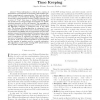Free Online Productivity Tools
i2Speak
i2Symbol
i2OCR
iTex2Img
iWeb2Print
iWeb2Shot
i2Type
iPdf2Split
iPdf2Merge
i2Bopomofo
i2Arabic
i2Style
i2Image
i2PDF
iLatex2Rtf
Sci2ools
123
Voted
PERCOM
2003
ACM
2003
ACM
Evaluation of Kalman Filtering for Network Time Keeping
Time information is critical for a variety of applications in distributed environments that facilitate pervasive computing and communication. This work describes and evaluates a novel Kalman filtering algorithm for endto-end time synchronization between a client computer and a server of "true" time [e.g., a Global Positioning System (GPS) source] using messages transmitted over packetswitched networks, such as the internet. The messages exchanged have the network time protocol (NTP) format, and the algorithm evaluated, is performed only at the client side. The Kalman filtering algorithm is compared to two other techniques widely used, based on linear programming and statistical averaging, and the experiments involve independent consecutive measurements (Gaussian case) or measurements exhibiting long-range dependence (self-similar case). Performance is evaluated according to the estimation error of frequency offset and time offset between client and server clock, the standard ...
Endto-end Time Synchronization | Kalman Filtering Algorithm | Network Time Protocol | PERCOM 2003 | Wireless Networks |
| Added | 24 Dec 2009 |
| Updated | 24 Dec 2009 |
| Type | Conference |
| Year | 2003 |
| Where | PERCOM |
| Authors | Aggelos Bletsas |
Comments (0)

